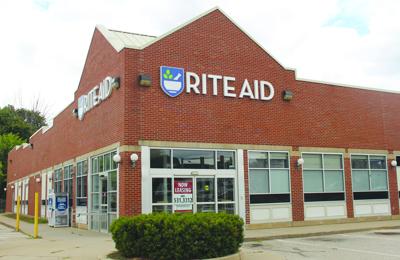LACONIA — At the intersection of Union and Gilford Avenues, for many years, medical patients filled their prescriptions at the Rite Aid pharmacy. It’s closed now, and some patients are unsure what they should do in order to meet their medication needs.
It was in June when Rite Aid notified patients and providers their Laconia location would close, and if patients did not take proactive action, their prescriptions would be transferred to CVS in Laconia, located at Busy Corner.
“I’m sure it was not an insignificant number [of patients] but it’s hard to quantify that,” Dr. Michael McLeod, associate chief clinical officer with Family Tree Health Care of Concord Hospital Medical Group, said in an interview on Wednesday.
The number of prescriptions doesn’t necessarily reflect the number of patients affected — many patients have multiple prescriptions, but the number of prescriptions formerly filled at the Laconia Rite Aid was in the hundreds, McLeod said.
“A lot of patients were proactive.”
Doctors, upon learning of the impending closure of the Laconia Rite Aid, worked to inform patients and create plans for their health care moving forward. Some kept their prescriptions at the Laconia CVS, while others had theirs transferred to other pharmacies in the area. Concord Hospital Health System has a team dedicated to helping patients transfer medications between pharmacies.
“It all depends on where you live,” McLeod said.
In many communities, there are numerous local options for patients to turn to — grocery stores like Hannaford have pharmacies inside, and there are Walgreens and CVS locations throughout the region. Increasingly popular is the option to have your prescriptions mailed to you, which could assist patients who live far from brick-and-mortar pharmacies.
“Any changes are difficult, but it seems that we’ve hit sort of a steady state,” McLeod said.
Patients have complained about longer lines at their new pharmacies, though, which McLeod said may have something to do with those stores absorbing new patients.
“Patients change pharmacies all the time,” he said.
Patients who have questions regarding their prescriptions or who want to transfer them to another pharmacy should contact their provider, either by phone or through their patient portal.
Mike Nigro of Moultonborough was one of those patients — he’d picked up prescriptions at the Meredith Rite Aid until its closure, and proactively requested new prescriptions be filled by the Walgreens location in Wolfeboro.
“Pretty much for the last 15 years, yeah,” he said Wednesday morning.
At first, he was told by workers at the Meredith Rite Aid his prescriptions would transfer to the location in Laconia, but it closed down, too. He then learned they’d be automatically transferred to the CVS in Laconia.
“Why’d they even tell me they were transferring them there?” he said.
To save himself some time and provide for convenience, he had his prescriptions transferred to the Walgreens in Wolfeboro. But when he went there to collect them, they weren’t available.
After confirming multiple times with his physician that he and his wife’s prescriptions were sent to the Wolfeboro Walgreens, and driving back to the pharmacy to collect them, he learned they still weren’t available.
“It went on and on,” he said. “I just kind of got tired of it.”
After contacting a regional office, Nigro learned some prescriptions are apparently held at a distribution center and transported to the local pharmacy when needed. Though they’re “in and filled,” he said, they aren’t physically available at the pharmacy immediately.
Over the last 15 years, Nigro said, he’s only experienced that once or twice, and only when trying to collect uncommon drugs.
“That’s aggravating in itself, finding it out,” he said. “Rite Aid was really good at automatic refills.”
Since the closure of the Laconia Rite Aid in June, it’s only been over the last two weeks that Nigro's prescription issues were ironed out.
“We never had a problem like that with pharmacies,” he said.
Adding to Nigro’s aggravation was the experience he had at the pharmacy itself. Especially in the time immediately following Rite Aid’s closure, lines were long at the Wolfeboro Walgreens, and there were few staff available to serve customers, leading to wait times of up to 30 minutes.
“You go to a pharmacy, you want medicine,” he said. “You don’t want bread, you don’t want milk.”
“I hope they get their act together.”
While the Rite Aid closures in Laconia, Meredith and Plymouth may have affected patients in those areas, the impact to patients and providers on the other side of the lake has been subdued.
At Huggins Hospital in Wolfeboro, leaders haven’t heard about much of an impact, if any, in their area.
But they are looking at creative ways to make receiving prescriptions easier on patients.
“To improve access to medications in our area, we are focusing on making sure our patients have their medications filled here at the hospital prior to being discharged from our inpatient care,” Huggins Hospital Chief Strategy Officer Monika O’Clair wrote in an email. “Other hospitals also provide similar services.”
And at CareWell Urgent Care and ClearChoiceMD, nurse practitioner and lead provider Brandy Hall said they haven’t noticed a major disruption to their patients.
“The pharmacy closures, they haven’t significantly affected our urgent care operations in the Lakes Region,” Hall said. “We are hearing patients frequently report longer pharmacy wait times and additional travel that’s now required.”
Some patients request prescriptions be sent to an alternative pharmacy due to the longer wait times, but Hall said they’ve been able to provide care and medications as usual. She’s not worried about barriers to care in this context, but CareWell and ClearChoiceMD offer in-house dispensing of medications for common urgent care conditions.
“Patients are able to receive a full course of treatment at a minimal cost without visiting a pharmacy at the time of their visit,” Hall said, noting the cost is limited to $15 per prescription.


















(0) comments
Welcome to the discussion.
Log In
Keep it Clean. Please avoid obscene, vulgar, lewd, racist or sexually-oriented language.
PLEASE TURN OFF YOUR CAPS LOCK.
Don't Threaten. Threats of harming another person will not be tolerated.
Be Truthful. Don't knowingly lie about anyone or anything.
Be Nice. No racism, sexism or any sort of -ism that is degrading to another person.
Be Proactive. Use the 'Report' link on each comment to let us know of abusive posts.
Share with Us. We'd love to hear eyewitness accounts, the history behind an article.